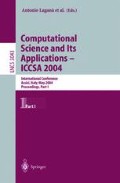Abstract
In this article, we present a context-based security management system that aims at securing resources in heterogeneous networks. Our approach relies on a federative model, where resources are logically grouped into federations (according to the type of services they provide or according to their physical location, in a business for instance). Security management relies on a set of contextual information collected from the user and the resource environments, and that infers the security level to enforce. These security levels are dynamically deduced using the MAUT algorithm.
Access this chapter
Tax calculation will be finalised at checkout
Purchases are for personal use only
Preview
Unable to display preview. Download preview PDF.
References
Weiser, M.: The Computer for the 21st Century. Scientific American 265(3), 66–75 (1991)
CSI/FBI, 2002 CSI/FBI Computer Crime and Security Survey
Kouadri Mostéfaoui, G.: Security in Pervasive Environments, What’s Next. In: The proceedings of the 2003 International Conference on Security and Management (SAM 2003), Las Vegas, Nevada, USA (June 2003)
Kouadri Mostéfaoui, G., Brézillon, P.: A generic framework for context-based distributed authorizations. In: Blackburn, P., Ghidini, C., Turner, R.M., Giunchiglia, F. (eds.) CONTEXT 2003. LNCS, vol. 2680, pp. 204–217. Springer, Heidelberg (2003)
The Jini homepage, www.jini.org
Keeney, R.L., Raiffa, H.: Decisions with Multiple Objectives: Preferences and Value Tradeoffs. John Wiley & Sons, New York (1976)
Winterfeld, D., Edwards, W.: Decision Analysis and Behavioral Research. Cambridge University Press, Cambridge
Schaefer, R.: Rules for Using Multi-Attribute Utility Theory for Estimating a User’s Interests. In: Proceedings of the ninth GI-Workshop. ABIS-Adaptivität und Benutzermodellierung in interaktiven softwaresystemen, Dortmund, Germany (2001)
Author information
Authors and Affiliations
Editor information
Editors and Affiliations
Rights and permissions
Copyright information
© 2004 Springer-Verlag Berlin Heidelberg
About this paper
Cite this paper
Mostéfaoui, G.K., Kim, M., Chung, M. (2004). Supporting Adaptive Security Levels in Heterogeneous Environments. In: Laganá, A., Gavrilova, M.L., Kumar, V., Mun, Y., Tan, C.J.K., Gervasi, O. (eds) Computational Science and Its Applications – ICCSA 2004. ICCSA 2004. Lecture Notes in Computer Science, vol 3043. Springer, Berlin, Heidelberg. https://doi.org/10.1007/978-3-540-24707-4_65
Download citation
DOI: https://doi.org/10.1007/978-3-540-24707-4_65
Publisher Name: Springer, Berlin, Heidelberg
Print ISBN: 978-3-540-22054-1
Online ISBN: 978-3-540-24707-4
eBook Packages: Springer Book Archive

